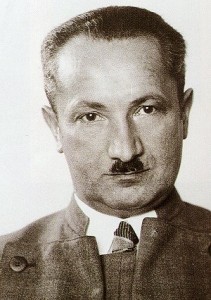
A quotation from Martin Heidegger’s Winter Semester course of 1933–34. Earlier that year the National Socialists under Adolf Hitler had come to power. Heidegger had become Rector of the University of Freiburg and was an active supporter of the Nazi regime. The quotation speaks to the state of Heidegger’s thinking. Note also that this is more than five years before the next World War would begin:
“One word stands great and simple at the beginning of the saying: polemos, war. This does not mean the outward occurrence of war and the celebration of what is ‘military,’ but rather what is decisive: standing against the enemy. We have translated this word with ‘struggle’ to hold on to what is essential; but on the other hand, it is important to think over that it does not mean agon, a competition in which two friendly opponents measure their strengths, but rather the struggle of polemos, war. This means that the struggle is in earnest; the opponent is not a partner but an enemy. Struggle as standing against the enemy, or more plainly: standing firm in confrontation. An enemy is each and every person who poses an essential threat to the Dasein of the people and its individual members. The enemy does not have to be external, and the external enemy is not even always the more dangerous one. And it can seem as if there were no enemy. Then it is a fundamental requirement to find the enemy, to expose the enemy to the light, or even first to make the enemy, so that this standing against the enemy may happen and so that Dasein may not lose its edge. The enemy can have attached itself to the inner-most roots of the Dasein of a people and can set it-self against this people’s own essence and act against it. The struggle is all the fiercer and harder and tougher, for the least of it consists in coming to blows with one another; it is often far more difficult and wearisome to catch sight of the enemy as such, to bring the enemy into the open, to harbor no illusions about the enemy, to keep oneself ready for attack, to cultivate and intensify a constant readiness and to prepare the attack looking far ahead with the goal of total annihilation.”*
That’s quoted in Charles Fried’s “A Letter to Emmanuel Faye.“ Fried, a philosophy professor at Boston College, comments on his own engagement with Heidegger: “Very quickly I came to see that in Heidegger I had found an even more profound critique than in Nietzsche of the Enlightenment and its roots in Western thought. Heidegger indicated from the very start of his lectures that this would be an Auseinandersetzung, a confrontation, not only with Nietzsche but with the entirety of the Western tradition reaching back to Plato, brought to its highest pitch of nihilism in and through Nietzsche.”
“Heidegger’s struggle is to ignite that polemos, to lead the Germans to den anderen Anfang,the other inception,in a revolutionary confrontation with the first inception (der erste Anfang) among the Greeks.For Heidegger, this revolution means a rejection of the universalism, the egalitarianism, and the idealism that he sees as rooted in the thinking inaugurated by Plato, adopted into the Judeo-Christian tradition, and culminating in the secular liberalism of the Enlightenment and the radical socialism of Marx. For Heidegger, this means resolutely belonging to a particular place, a particular time, and a particular people with its particular destiny. It means embracing the radical finitude of being human and a radical boundedness to human community. It means polemos as Aus-einander-setzung: the setting oneself out and apart from other peoples in confrontation, the self-assertion (Selbstbehauptung)of a people as distinct, separate, and incommensurable with other peoples. It means the end of humanist universalism, human rights, and respect for persons as created in the image of God(or secularized correlates, such as Kant’s respect for persons as ends in themselves). Furthermore, for Heidegger, this means that it must be the German destiny to carry out this polemos for the sake of every people worthy of that name (so, not the ‘negroes’ or the Jews): to recover the radical rootedness of historical belonging and to reject the universal homogenization and leveling that he designated with the name of liberalism. So, in the end, Karl Löwith’s report from 1936 is dispositive: ‘Heidegger agreed with me without reservation [that his Nazism was grounded in his philosophy], and added that his concept of ‘historicity’ was the basis of his political ‘engagement’.’”
* Source: Charles Fried, “A Letter to Emmanuel Faye.” Philosophy Today, 2011. Related: My close reading of Heidegger’s “What Is Metaphysics?”, in the Philosophers, Explained series:
exactly right. The Heideggerian spirit now dominates the world – in a struggle against a doubting universalism. This Neofascism is beyond left and right . I am working on this problem
Clearly, the quote from the student’s transcript of a seminar which is not part of Heidegger’s collected works is an analysis of how scapegoating works by “finding” IN the world an enemy which evinces from within one’s own understanding.
The quote from Fried is expansive far beyond the point of the earlier quote, and Fried misunderstands Heidegger’s project fundamentally.
Interesting. You delete a directly pertinent comment because—well, who knows but you.
So, here’s a chance to think again, take 2:
Clearly, the quote from the student’s transcript of a seminar which is not part of Heidegger’s collected works is an analysis of how scapegoating works by “finding” IN the world an enemy which evinces from within one’s own understanding.
The quote from Fried is expansive far beyond the point of the earlier quote, and Fried misunderstands Heidegger’s project fundamentally.
I would be glad to detail more.